Research
Faculty in the Department of Communication Studies are some of the most prolific and influential researchers in the discipline. Collectively, their work has received dozens of national and international awards and is a driving force in conversations about rhetoric, media, culture, and public address. Our faculty publish monographs with prestigious university presses and articles in the field’s top journals. Some of our faculty’s areas of expertise include sports and fandom, medical humanities, celebrity studies, legal studies, feminist and queer studies, populism, and critical studies of capitalism.
See highlights of our faculty research below.
Jeff Bennett
Books
 Managing Diabetes: The Cultural Politics of Disease
Managing Diabetes: The Cultural Politics of Disease
More than 29 million people in the United States, more than nine percent of the population, have some form of diabetes. In Managing Diabetes, Jeff Bennett focuses on how the disease is imagined in public culture. Bennett argues that popular anecdotes, media representation, and communal myths are as meaningful as medical and scientific understandings of the disease.
In focusing on the public character of the disease, Bennett looks at health campaigns and promotions as well as the debate over public figures like Sonia Sotomayor and her management of type 1 diabetes. Bennett examines the confusing and contradictory public depictions of diabetes to demonstrate how management of the disease is not only clinical but also cultural. Bennett also has type 1 diabetes and speaks from personal experience about the many misunderstandings and myths that are alive in the popular imagination. Ultimately, Managing Diabetes offers a fresh take on how disease is understood in contemporary society and the ways that stigma, fatalism, and health can intersect to shape diabetes’s public character. This disease has dire health implications, and rates keep rising. Bennett argues that until it is better understood it cannot be better treated.
 Banning Queer Blood: Rhetorics of Citizenship, Contagion, and Resistance
Banning Queer Blood: Rhetorics of Citizenship, Contagion, and Resistance
In Banning Queer Blood, Bennett frames blood donation as a performance of civic identity closely linked to the meaning of citizenship. However, with the advent of AIDS came the notion of blood donation as a potentially dangerous process. Bennett argues that the Food and Drug Administration, by employing images that specifically depict gay men as contagious, has categorized gay men as a menace to the nation. The FDA’s ban on blood donation by gay men remains in effect and serves to propagate the social misconceptions about gay men that circulate within both the straight and gay communities today.
Bennett explores the role of scientific research cited by these banned-blood policies and its disquieting relationship to government agencies, including the FDA. Bennett draws parallels between the FDA’s position on homosexuality and the historical precedents of discrimination by government agencies against racial minorities. The author concludes by describing the resistance posed by queer donors, who either lie in order to donate blood or protest discrimination at donation sites, and by calling for these prejudiced policies to be abolished.
Articles
Jeffrey A. Bennett, Resisting the Rhetoric of Indexing: Disability, Access, and the 2005 Tennessee State Capitol Sit-In, Communication and Critical/Cultural Studies, 19.3 (2022): 235-253. DOI: 10.1080/14791420.2022.2086280
Jeffrey A. Bennett, “Everyday Life and the Management of Risky Bodies in the COVID-19 Era,” Cultural Studies 35 (2021): 347-357. DOI: 10.1080/09502386.2021.1898015
Bonnie Dow
Books
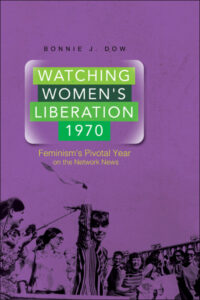 Watching Women’s Liberation, 1970: Feminism’s Pivotal Year on the Network News
Watching Women’s Liberation, 1970: Feminism’s Pivotal Year on the Network News
In 1970, ABC, CBS, and NBC—the “Big Three” of the pre-cable television era—discovered the feminist movement. From the famed sit-in at Ladies’ Home Journal to multi-part feature stories on the movement’s ideas and leaders, nightly news broadcasts covered feminism more than in any year before or since, bringing women’s liberation into American homes.
In Watching Women’s Liberation,1970: Feminism’s Pivotal Year on the Network News, Bonnie Dow uses case studies of key media events to delve into the ways national TV news mediated the emergence of feminism’s second wave. First legitimized as a big story by print media, the feminist movement gained broadcast attention as the networks’ eagerness to get in on the action was accompanied by feminists’ efforts to use national media for their own purposes. Dow chronicles the conditions that precipitated feminism’s new visibility and analyzes the verbal and visual strategies of broadcast news discourses that tried to make sense of the movement. Groundbreaking and packed with detail, Watching Women’s Liberation, 1970 shows how feminism went mainstream—and what it gained and lost on the way.
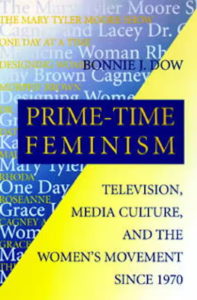 Primetime Feminism: Television, Media Culture, and the Women’s Movement Since 1970
Primetime Feminism: Television, Media Culture, and the Women’s Movement Since 1970
Dow discusses a wide variety of television programming and provides specific case studies of The Mary Tyler Moore Show, One Day at a Time, Designing Women, Murphy Brown, and Dr. Quinn, Medicine Woman. She juxtaposes analyses of genre, plot, character development, and narrative structure with the larger debates over feminism that took place at the time the programs originally aired. Dow emphasizes the power of the relationships among television entertainment, news media, women’s magazines, publicity, and celebrity biographies and interviews in creating a framework through which television viewers “make sense” of both the medium’s portrayal of feminism and the nature of feminism itself.
Bohyeong Kim
Articles
Bohyeong Kim, “Thrift Television in South Korea: The Long Recession and the Financial Makeover of Female Consumers in Homo Economicus,” Television and New Media 23 (2021): 257-275. DOI: 10.1177/1527476420987
Bohyeong Kim, “The Ecosystem of a ‘Wealth-Tech’ Culture: The Birth of Networked Financial Subjects in South Korea,” Media, Culture, & Society, 42 (2020): 207–224. DOI: 10.1177/0163443719853497
Claire King
Books
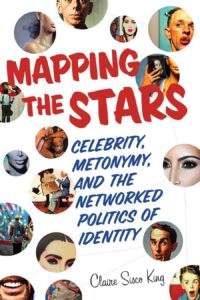 Mapping the Stars: Celebrity, Metonymy, and the Networked Politics of Identity
Mapping the Stars: Celebrity, Metonymy, and the Networked Politics of Identity
Often dismissed as trivial or even “trash,” celebrity culture offers a unique way of considering what it means to be human. In Mapping the Stars, Claire Sisco King shows how close analysis of the complex and sometimes contradictory forms of celebrity culture can challenge dominant ideas about selfhood. In particular, as a formation that develops across time, mediums, and texts, celebrity is useful for demonstrating how humanness is defined by relationality, contingency, and even vulnerability.
King considers three stars with popular and controversial personas: Norman Rockwell, Will Smith, and Kim Kardashian. Working in very different contexts and with very different public images, these figures nonetheless share a consistent, if not conspicuous, interest in celebrity as a construct. Offering intertextual readings of their public images across such sites as movie posters, magazines, cinema, and social media—and deploying rhetorical theories of metonymy (a linguistic device linking signifiers by shared associations)—King argues that these stars’ self-reflexive attention to the processes by which celebrity is created and constrained creates opportunities for reframing public discourse about what it means to be famous and what it means to be a person.
 Washed in Blood: Male Sacrifice, Trauma, and the Cinema
Washed in Blood: Male Sacrifice, Trauma, and the Cinema
Viewers of Hollywood action films are no doubt familiar with the sacrificial victim-hero, the male protagonist who nobly gives up his life so that others may be saved. Washed in Blood argues that such sacrificial films are especially prominent in eras when the nation—and American manhood—is thought to be in crisis. The sacrificial victim-hero, continually imperiled and frequently exhibiting classic symptoms of post-traumatic stress disorder, thus bears the trauma of the nation.
King offers an in-depth study of three prominent cycles of Hollywood films that follow the sacrificial narrative: the early–to–mid 1970s, the mid–to–late 1990s, and the mid–to–late 2000s. From Vietnam-era disaster movies to post-9/11 apocalyptic thrillers, she examines how each film represents traumatized American masculinity and national identity. What she uncovers is a cinematic tendency to position straight white men as America’s most valuable citizens—and its noblest victims.
Articles
Claire Sisco King, “‘Bach, Please’: Nashville Bachelorette Party Culture’s Investments in White Southern Femininity,” Communication and Critical/Cultural Studies (2023). DOI: 10.1080/14791420.2022.2164024
Terrell Taylor and Claire Sisco King, “Monstrous Proletariat: The Racial Chimera in District 9 and Sorry to Bother You,” Literature and Science 14 (2021-2022): 78-93. ISSN 1754-646
John Sloop
Books
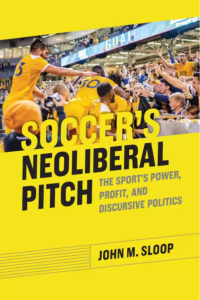 Soccer’s Neoliberal Pitch: The Sport’s Power, Profit, and Discursive Politics
Soccer’s Neoliberal Pitch: The Sport’s Power, Profit, and Discursive Politics
American sports agnostics might raise an eyebrow at the idea that soccer represents a staging ground for cultural, social, and political possibility. It is just another game, after all, in a society where mass-audience spectator sports largely avoid any political stance other than a generic, corporate-friendly patriotism. But John M. Sloop picks up on the work of Laurent Dubois and others to see in American soccer—a sport that has achieved immense participation and popularity despite its struggle to establish major league status—a game that permits surprisingly diverse modes of thinking about national identity because of its marginality.
As a rhetorician who draws on both critical theory and culture, Sloop seeks to read soccer as the game intersects with gender, race, sexuality, and class. The result of this engagement is a sense of both enormous possibility and real constraint. If American soccer offers more possibility because of its marginality, looking at how those possibilities are constrained can provide valuable insights into neoliberal logics of power, profit, politics, and selfhood.
In Soccer’s Neoliberal Pitch, Sloop analyzes a host of soccer-adjacent phenomena: the equal pay dispute between the US women’s national team and the US Soccer Federation, the significance of hooligan literature, the introduction of English soccer to American TV audiences, the strange invisibility of the Mexican soccer league despite its consistent high TV ratings, and the reading of US national teams as “underdogs” despite the nation’s quasi-imperial dominance of the Western hemisphere. An invaluable addition to a growing bookshelf on soccer titles, Soccer’s Neoliberal Pitch serves as a model for critical cultural work with sports, with appeal to not only sports studies, but cultural studies, communication, and even gender studies classrooms.
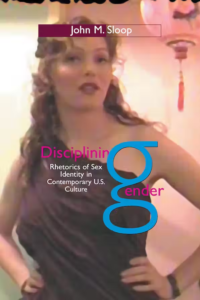 Disciplining Gender: Rhetorics of Sex Identity in Contemporary U.S. Culture
Disciplining Gender: Rhetorics of Sex Identity in Contemporary U.S. Culture
An expert on the rhetoric of the mass media, Sloop has written several books on how the spoken and written word can influence political and cultural debate. In Disciplining Gender, he turns his attention to a topic that has attracted widespread public discussion—the treatment of gender ambiguity in American culture. He offers critical readings of five cases, showing the extent to which, in each instance, public discourse and media representations have served to reinforce dominant norms and constrain or “discipline” any behavior that blurs or subverts conventional gender boundaries.
The five cases include John/Joan or David Reimer, Brandon Teena, k.d. lang, Janet Reno, and Barry Winchell/Calpernia Addams. Sloop draws on queer theory and research in the field of critical rhetoric to examine representations of “gender trouble” in these much-publicized stories. In each case, he provides a comprehensive analysis of the public discussions of their significance. In short, rather than simply study the people and circumstances involved in each case, he examines the public meanings attached to them and the implications of those meanings for how contemporary culture comes to understand what “man” and “woman” mean and which sexual behaviors are appropriate and inappropriate.
In highlighting the ideological constraints imposed by our society, Sloop also suggests the ways that these constraints might be loosened and understandings of gender and sexuality diversified.
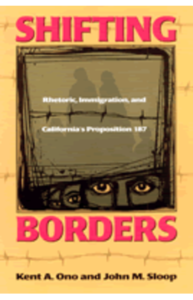 Shifting Borders: Rhetoric, Immigration, and California’s Proposition 187 (with Kent Ono)
Shifting Borders: Rhetoric, Immigration, and California’s Proposition 187 (with Kent Ono)
How do we learn to recognize the damning effects of good rhetorical intentions? And where will we find arguments which escape this trap that permeates the liberal social policy world? Shifting Borders uses an evaluation of the debate over California Proposition 187 to demonstrate how this quandary is best understood by close interrogation of mainstream reports and debates and by bringing to the fore voices that are often left out of mediated discussions.
It is these voices outside the mainstream, so-called “outlaw” discourses, that hold the best possibilities for real social change. To illustrate their claim, the authors present dominant and outlaw discourses around Proposition 187, from television reports, internet chat sites, and religious discourse to coverage of the Los Angeles Times. Their critique ably demonstrates how difficult it is to maintain a position outside the mainstream, but also how important it is for the press, citizens and scholars to actively search out such voices. The findings are organized through a model that provides an innovative method for understanding events and arguments through their rhetorical and communicative construction. In a world where the mediated word defines so much of what we know, Shifting Borders provides a lucid introduction to analyzing the spoken and written word that constitutes political debate in contemporary U.S. culture. In doing so, it makes an important contribution to any future development of progressive political strategy.
The Cultural Prison: Discourse, Prisoners, and Punishment
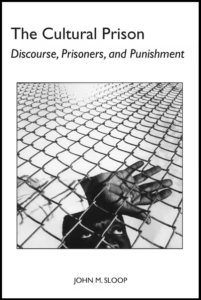 The Cultural Prison brings a new dimension to the study of prisoners and punishment by focusing on how the punishment of American offenders is represented and shaped in the mass media through public arguments. The study is based on an analysis of 642 articles collected by the author from American popular journals and magazines, as well as newspaper accounts, films, and public speeches, spanning the years 1950 to 1992. By piecing together and studying these popular narratives, he divides the history of prisoners and punishment into four eras, each marked by a shift in value system. Sloop argues that the discourse, or rhetoric, surrounding prisoners and punishment on the public level works as a historical force that shapes contemporary culture.
The Cultural Prison brings a new dimension to the study of prisoners and punishment by focusing on how the punishment of American offenders is represented and shaped in the mass media through public arguments. The study is based on an analysis of 642 articles collected by the author from American popular journals and magazines, as well as newspaper accounts, films, and public speeches, spanning the years 1950 to 1992. By piecing together and studying these popular narratives, he divides the history of prisoners and punishment into four eras, each marked by a shift in value system. Sloop argues that the discourse, or rhetoric, surrounding prisoners and punishment on the public level works as a historical force that shapes contemporary culture.
The author is concerned that the public seems to have an inability or unwillingness to question or resist cultural definitions of normalcy and legal behavior. He explains that ideally moral behavior should be a matter of public debate rather than of unquestioned perpetuation, and he urges increased understanding of institutional and cultural discipline and our questioning the ways in which the constitution of punishment and prisoners influences us culturally.
The”cultural prison” refers to the way in which this study acts as an investigation of “the discipline of discipline”; it is an examination of the way in which discipline is shaped and formed in public discourse. The volume concludes with a fascinating account of the move to electronic means of surveillance; coupled with the representations of the prisoner along the lines of race and gender, it explains what these new techniques mean to contemporary culture.
Articles
John M. Sloop, “The (Always Already Unrealizable) Fairytale” Ear Hustle, The (Black) Family, and the Entrepreneurial Self,” Rhetoric, Politics & Culture, 1 (2021): 129-160. ISSN 2693-7522
Paul Stob
Books
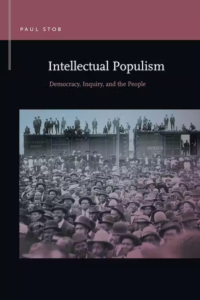 Intellectual Populism: Democracy, Inquiry, and the People
Intellectual Populism: Democracy, Inquiry, and the People
In response to denunciations of populism as undemocratic and anti-intellectual, Intellectual Populism argues that populism has contributed to a distinct and democratic intellectual tradition in which ordinary people assume leading roles in the pursuit of knowledge. Focusing on the Gilded Age and Progressive Era, the decades that saw the birth of populism in the United States, this book uses case studies of certain intellectual figures to trace the key rhetorical appeals that proved capable of resisting the status quo and building alternative communities of inquiry. As this book shows, Robert Ingersoll (1833–1899), Mary Baker Eddy (1821–1910), Thomas Davidson (1840–1900), Booker T. Washington (1856–1915), and Zitkála-Šá (1876–1938) deployed populist rhetoric to rally ordinary people as thinkers in new intellectual efforts. Through these case studies, Intellectual Populism demonstrates how orators and advocates can channel the frustrations and energies of the American people toward productive, democratic, intellectual ends.
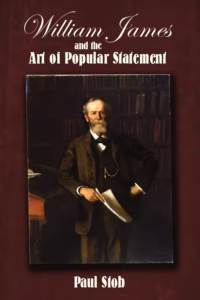 William James and the Art of Popular Statement
William James and the Art of Popular Statement
At the turn of the twentieth century, no other public intellectual was as celebrated in America as the influential philosopher and psychologist William James. Sought after around the country, James developed his ideas in lecture halls and via essays and books intended for general audiences. Reaching out to and connecting with these audiences was crucial to James—so crucial that in 1903 he identified “popular statement,” or speaking and writing in a way that animated the thought of popular audiences, as the “highest form of art.” Stob’s thought-provoking history traces James’s art of popular statement through pivotal lectures, essays, and books, including his 1878 lectures in Baltimore and Boston, “Talks to Teachers on Psychology,” “The Varieties of Religious Experience,” and “Pragmatism.” The book explores James’s unique approach to public address, which involved crafting lectures in science, religion, and philosophy around ordinary people and their experiences. With democratic bravado, James confronted those who had accumulated power through various systems of academic and professional authority, and argued that intellectual power should be returned to the people. Stob argues that James gave those he addressed a central role in the pursuit of knowledge and fostered in them a new intellectual curiosity unlike few scholars before or since.
Isaac West
Books
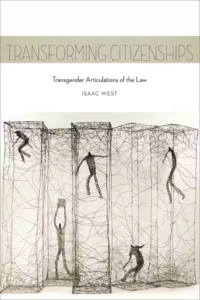 Transforming Citizenships: Transgender Articulations of the Law
Transforming Citizenships: Transgender Articulations of the Law
Transforming Citizenships engages the performativity of citizenship as it relates to transgender individuals and advocacy groups. Instead of reading the law as a set of self-executing discourses, Isaac West takes up transgender rights claims as performative productions of complex legal subjectivities capable of queering accepted understandings of genders, sexualities, and the normative forces of the law.
Drawing on an expansive archive, from the correspondence of a transwoman arrested for using a public bathroom in Los Angeles in 1954 to contemporary lobbying efforts of national transgender advocacy organizations, West advances a rethinking of law as capacious rhetorics of citizenship, justice, equality, and freedom. When approached from this perspective, citizenship can be recuperated from its status as the bad object of queer politics to better understand how legal discourses open up sites for identification across identity categories and enable political activities that escape the analytics of heteronormativity and homonationalism.
Articles
Jessica Kurr and Isaac West, “Analogical Arguments: Bridging Trans Social Movements and Civil Rights Movements,” in The Rhetoric of Social Movements: Networks, Power, and New Media, ed. Nathan Crick (New York: Routledge, 2020), 240-253. DOI: 10.4324/9780429436291
